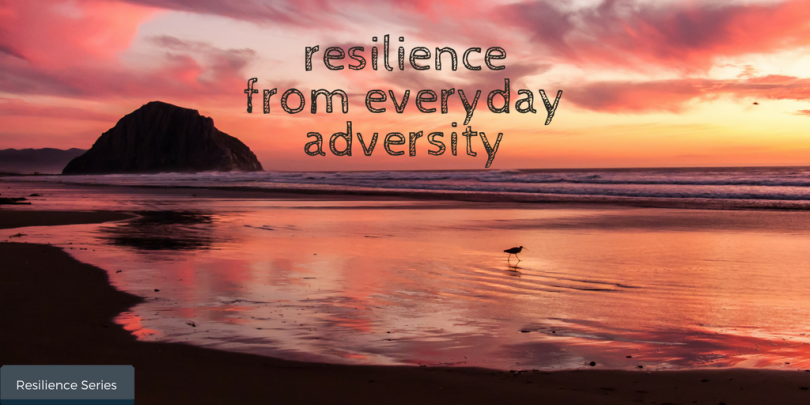
I started looking at resilience a couple of years ago, after a particularly difficult time in my life. I noticed how it manifests differently in each of us. Where do we get our resilience from? Is it formed from nature, nurture or a combination of both? What impacts our resilience; positive or negative?
I should say that ‘Resilience’ is a broad term. Here I’m referring to the endless changes that we absorb in daily life. These influence adjustments in our mental and physical health. Our resilience levels are not a sign of success or failure, but rather part of our development. We all become more or less resilient at certain periods naturally.
Resilience varies from day-to-day for most of us. One day we feel we can take on the world and the next we’d rather stay under our duvet. We might handle one subject well and feel all at sea with another. We may feel vulnerable with some groups of people. It’s likely that this sense of resilience is not obvious to those around us most of the time as we all create coping mechanisms to handle these challenges.
I’m going to start with the sources of resilience. Why? We know that increased self-awareness supports improved mental health. If we understand our sources of resilience, we can develop them or at least understand how they are impacted. One source will likely have an impact on the another. There is also a link between mind and body as well; if your mental resilience is compromised, so is your physical and vice versa.
Genetic
Research in the arena of psychobiology and neurobiology suggests some resilience is drawn from our DNA. It suggests that there is a level of interaction between our environmental experiences and our genetic, neural and immune systems. In other words, external factors can contribute to the changing of gene characteristics.
Environment
Whether it be home, work or social situations; environment impacts us all. These environments may stay the same or change significantly over time. Consider the impact of being bullied at school for example or being indulged during childhood years. We may feel comfortable in our job or on edge working for a new company.
Experiences and Learning
Whether we experience something small or have a significant life challenge we will learn and adapt from that experience. These will range across the spectrum; from pleasurable through to traumatic. We assimilate them and even if we do not remember them, they inform our future responses.
Lifestyle
We know lifestyle effects both our mental and physical health. This can be diet, exercise, drinking habits or addictions. There is so much information available to support a healthy lifestyle. We are habitual creatures. If we are feeling bad, we treat ourselves, knowing fully that it will impact how we feel the next day.
Interpersonal Resources
We talked above of social environment. I feel this deserves a special mention. Friends and family can support our mental health and resilience during difficult times. Such support allows for reflection, to experience empathy, become more self-aware, listen to other experiences or simply be diverted from our current thoughts. Sometimes we need to just ‘be’ with others.
Subject Matter
This is a most interesting thing. For an individual who appears resilient, there is usually a topic that creates an adverse and often surprising reaction. We’ve all seen sharp reactions regarding something that may appear trivial. Is it that most of us have something unprocessed or that we have yet to discover a coping strategy that works for that particular subject?
We talk of daily adversity; these are the incremental stresses we constantly deal with. Most of these are good for us and support our ongoing development. They are as influential in building our resilience as major life events. What do we do when we feel vulnerable? How do we use these sources? This is something I will explore over the next few months with you.
Next Two Articles:
- The Perception of Resilience
- Flex or fracture?
NOTE: I should stress that Resilience is a relatively new line of thought being researched by various bodies relative to other theories. What I discuss here is from my observations as well as drawing on emerging research and reports. Such progressing evidence is likely to continue to develop over time and I’m sure we will be revisiting this subject as new research is published.

Great article Zoe…interesting read and I can relate to many points your raise.
LikeLike
Thank you Jane, hard to know where to start really as its such a big subject. More to come soon!
LikeLike
[…] Resilience from Everyday Adversity […]
LikeLike
[…] Resilience from Everyday Adversity […]
LikeLike
Appreciation for really being thoughtful and also for deciding on certain marvelous guides most people really want to be aware of.
LikeLike